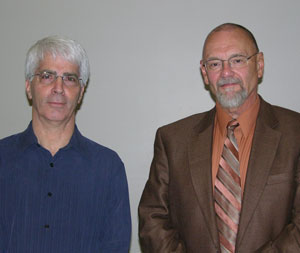 |
University of Arizona professor Ray Runyan, Ph.D., with UNMC Vice Chancellor for Research Tom Rosenquist, Ph.D., during Dr. Runyan’s recent visit to Omaha. |
During his research with animal models, Ray Runyan, Ph.D., professor in the University of Arizona Department of Cell Biology and Anatomy, found exposure to low levels of both pollutants has been shown to increase rates of congenital defects.
“It’s too soon to say these findings definitely translate to humans,” Dr. Runyan said. “But our findings show that in animals, these pollutants make such defects more likely.”
Dr. Runyan’s research, particularly of TCE, was sparked by the findings of an Arizona doctor who noted a spike in congenital heart defects among children living near military bases.
High levels of TCE — a chemical used to clean metal — are often found in water supplies near military bases and industrial sites.
|
|
He said exposure to low levels of arsenic has affected genes in animals in a way that increased the rate of heart defects.
UNMC Vice Chancellor for Research Tom Rosenquist, Ph.D., said Dr. Runyan is one of the first scientists in the world to look at the connection between these pollutants and congenital heart defects.
Dr. Runyan’s findings are important to Nebraska because there are significant levels of arsenic in the soil throughout almost the entire state and it is likely that TCE has been introduced into the soil and groundwater at the state’s industrial sites, Dr. Rosenquist said.
“We hear a lot about how these two pollutants contribute to cancer rates but you never hear anything about their connection to heart defects,” Dr. Rosenquist said. “The fact is the most common killer of babies is congenital heart defects. That’s what makes Dr. Runyan’s work so important and people in Nebraska should definitely be paying attention to his findings.”